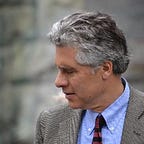Certainty is the Enemy of Truth: David Deutsch’s Infinite Explanations, the Limits of Knowledge, and the Value of Human Fallibility.
David Deutsch is an Oxford physicist and philosopher, widely regarded as a founder of quantum computing. His books, The Fabric of Reality and The Beginning of Infinity, range far beyond Physics to hypothesize that human knowledge is infinite and will ultimately enable us to explain and accomplish everything that is not forbidden by the laws of nature. Still, he suggests that our knowledge may not arrive at some final “absolute truth,” but will simply be an infinite series of increasingly powerful and useful approximations. To Deutsch, our quest for understanding is an endless process in which there will be no ball-spiking or mic-dropping moment, just ever more successful descriptions that approach but never arrive at a complete grasp of the underlying reality.
This unbridgeable gap between fundamental reality versus what human beings are capable of knowing has been a topic of philosophers and scientists since the beginnings of history. From Plato’s cave to Kant’s “thing-in-itself” to Heisenberg’s Uncertainty Principle, we have learned that our best answers lead mostly to more questions. Apparently, our comprehension of reality is destined to fall short of complete explanation.
The evidence starts with Deutsch himself, who, in suggesting that knowledge is infinite, sets up a distinction between the current state of knowledge and some future, more encompassing explanation. The gap between these current and future states of knowledge implies the existence of potential explanations that are yet to be discovered — the “known unknown,” if you will.
Deutsch’s conception of knowledge can be visualized as asymptotic; a curve of explanations that approaches but never arrives at absolute truth. We can picture a system in which the area under the curve represents knowledge that we can explain and where the asymptotic limit represents complete understanding.
The immediate implication: There is and always will be a gap between the current state of knowledge and any future state — an unbridgeable space between our potential explanations and the “absolute truth” — whatever that might be.
Surprisingly, it turns out that this gap is an utterly predictable feature of human cognition — it is inherent in the digital nature of what Deutsch means when he says “knowledge” or “explanations.” Our main cognitive trick, as human beings, is to carve the world up into chunks and attempt to understand the pieces. This “digital coding” is the fundamental nature of all sharable and re-usable knowledge. It is, quite literally, a fact of life: DNA is coded knowledge as are synapses and brains. Similarly language, and of course, computation and digitization are more efficient ways of capturing, storing and reusing information.
This digitization is extremely useful, but also inherently limited. Information theory tells us that simplification by coding always leaves stuff out. Reality, in contrast, appears to be infinitely continuous, that is, analog, in nature. Like the gap between the pixels in a digital picture, no matter how fine grained our digital knowledge, there’s still those damned spaces. Our comprehension of reality, using the digital tools we have, is asymptotic, just like the accuracy of that digital picture. We can come close, but we never get to spike the ball. This is David Deutsch’s insight.
It is also a great source of liberation for us humans. We can assume we are wrong. Whatever convictions we hold in the moment will be over-thrown in the future by some deeper, more powerful understanding. Paradoxically, this is not a reason to surrender or an excuse for inaction. It is, rather, a reason to act on our convictions — to put them out into the world to fend for themselves. Call them memes or influence or, to quote Steve Jobs, our “dents in the universe” — however modest or momentous. Make your dent, but be ready for it to morph into something other than what you originally intended.
In our moments of clarity, we have grasped this truth. The US Constitution strives for a “more perfect” union without prescribing specifics. Our economy thrives on “creative destruction” and the “build-test-learn” iterations of the modern startup. Science and societies advance by creating new ideas and trying to knock them down. The need for self-critical knowledge is another central point in Deutsch’s work.
In this way we collectively bend the arc of human history and find our way toward the infinite understanding that Deutsch believes is the unique, infinite, and universe-shaping role of human knowledge.
Interestingly, Deutsch suggests that knowledge is both infinite and, at the same time, will arrive at some final understanding, possibly because he does not assume that we are limited to a digital view of the world in perpetuity. His view leaves open the possibility of different, deeper, forms of knowledge that may allow us to break through the digital / rational boundary.
The nature of that breakthrough is as mysterious to us as the emergence of life would have been to a rock — the same stuff with an utterly different skill set. Nonetheless, it may be that we have a feeble sense of what that future breakthrough might look like — a topic I will save for next time.
In the meanwhile, simply remember: Just assume you are wrong. Certainty is the enemy of the truth.
